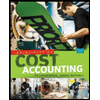Port Ormond Carpet Company manufactures carpets. Fiber is placed in process in the Spinning Department, where it is spun into yarn. The output of the Spinning Department is transferred to the Tufting Department, where carpet backing is added at the beginning of the process and the process is completed. On January 1, Port Ormond Carpet Company had the following inventories: Finished Goods $6,500 Work in Process-Spinning Department 1,200 Work in Process-Tufting Department 2,300 Materials 4,100 Departmental accounts are maintained for factory overhead, and both have zero balances on January 1. Manufacturing operations for January are summarized as follows: Jan. 1 Materials purchased on account, $84,700 2 Materials requisitioned for use: Fiber-Spinning Department, $42,800 Carpet backing-Tufting Department, $34,000 Indirect materials-Spinning Department, $3,400 Indirect materials-Tufting Department, $2,700 31 Labor used: Direct labor-Spinning Department, $26,600 Direct labor-Tufting Department, $17,600 Indirect labor-Spinning Department, $11,900 Indirect labor-Tufting Department, $11,800 31 Depreciation charged on fixed assets: Spinning Department, $5,400 Tufting Department, $4,000 31 Expired prepaid factory insurance: Spinning Department, $1,100 Tufting Department, $800 31 Applied factory overhead: Spinning Department, $22,200 Tufting Department, $18,950 31 Production costs transferred from Spinning Department to Tufting Department, $89,500 31 Production costs transferred from Tufting Department to Finished Goods, $151,400 31 Cost of goods sold during the period, $154,200 Required: 1. Journalize the entries to record the operations, using the dates provided with the summary of manufacturing operations. 2. Compute the January 31 balances of the inventory accounts. 3. Compute the January 31 balances of the factory overhead accounts.
Process Costing
Process costing is a sort of operation costing which is employed to determine the value of a product at each process or stage of producing process, applicable where goods produced from a series of continuous operations or procedure.
Job Costing
Job costing is adhesive costs of each and every job involved in the production processes. It is an accounting measure. It is a method which determines the cost of specific jobs, which are performed according to the consumer’s specifications. Job costing is possible only in businesses where the production is done as per the customer’s requirement. For example, some customers order to manufacture furniture as per their needs.
ABC Costing
Cost Accounting is a form of managerial accounting that helps the company in assessing the total variable cost so as to compute the cost of production. Cost accounting is generally used by the management so as to ensure better decision-making. In comparison to financial accounting, cost accounting has to follow a set standard ad can be used flexibly by the management as per their needs. The types of Cost Accounting include – Lean Accounting, Standard Costing, Marginal Costing and Activity Based Costing.
| Finished Goods | $6,500 |
| Work in Process-Spinning Department | 1,200 |
| Work in Process-Tufting Department | 2,300 |
| Materials | 4,100 |
| Jan. | 1 | Materials purchased on account, $84,700 |
| 2 | Materials requisitioned for use: | |
| Fiber-Spinning Department, $42,800 | ||
| Carpet backing-Tufting Department, $34,000 | ||
| Indirect materials-Spinning Department, $3,400 | ||
| Indirect materials-Tufting Department, $2,700 | ||
| 31 | Labor used: | |
| Direct labor-Spinning Department, $26,600 | ||
| Direct labor-Tufting Department, $17,600 | ||
| Indirect labor-Spinning Department, $11,900 | ||
| Indirect labor-Tufting Department, $11,800 | ||
| 31 | ||
| Spinning Department, $5,400 | ||
| Tufting Department, $4,000 | ||
| 31 | Expired prepaid factory insurance: | |
| Spinning Department, $1,100 | ||
| Tufting Department, $800 | ||
| 31 | Applied factory overhead: | |
| Spinning Department, $22,200 | ||
| Tufting Department, $18,950 | ||
| 31 | Production costs transferred from Spinning Department to Tufting Department, $89,500 | |
| 31 | Production costs transferred from Tufting Department to Finished Goods, $151,400 | |
| 31 | Cost of goods sold during the period, $154,200 |
| Required: | |
| 1. | |
| 2. | Compute the January 31 balances of the inventory accounts. |
| 3. | Compute the January 31 balances of the factory overhead accounts. |
Trending now
This is a popular solution!
Step by step
Solved in 3 steps







